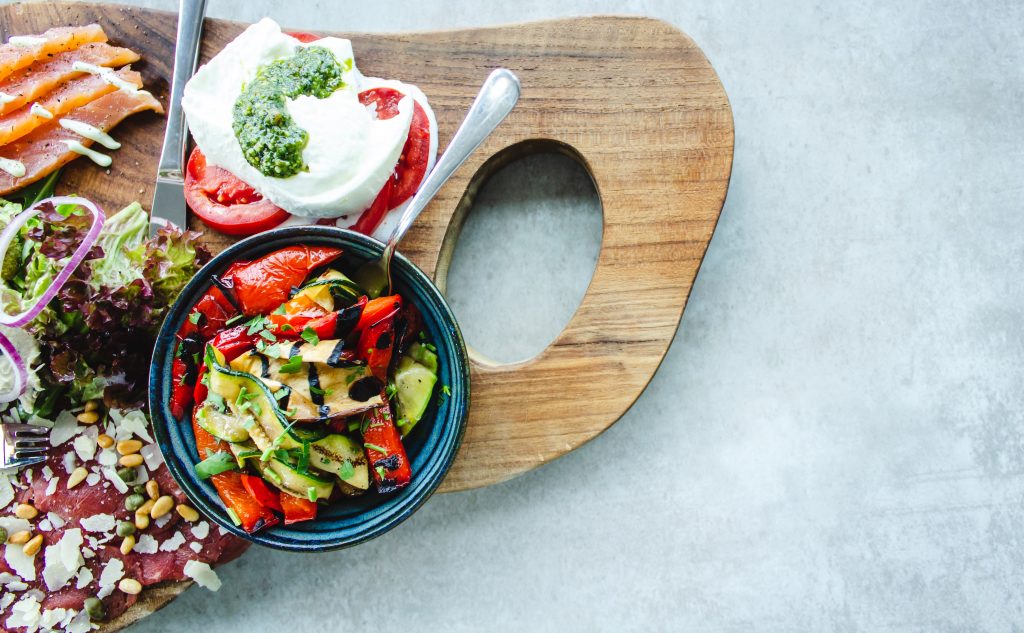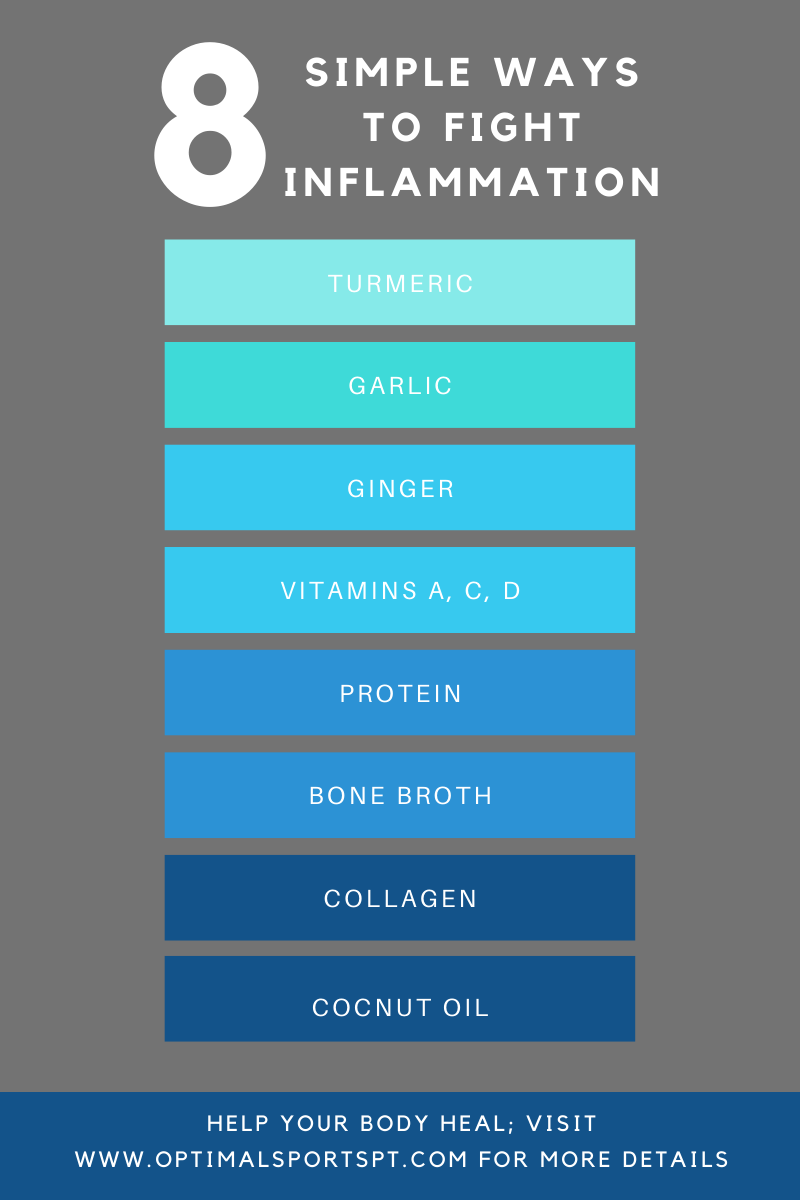
Have you ever sprained your ankle or experienced a joint injury? It hurt, turned red, and swelled up, right? These reactions are all normal symptoms of inflammation – your body’s natural response to injury.
Inflammation that occurs after an injury is the body’s first line of defense. It’s the signal to the immune system that something is wrong and to send help. These short-lived or acute symptoms are critical for the body and support the early stages of healing. There can be too much of a good thing. Prolonged or chronic inflammation puts your body on high alert at all times, effectively overworking your immune response. Chronic inflammation can have long-lasting effects on healing and your health.
But, you can fight chronic inflammation and help your body heal! Have you heard the saying ‘you are what you eat’? Research is showing that there are many foods and supplements that can help to fight inflammation. All while helping to support the body’s ability to heal. So, if you’ve recently experienced an injury try eating with inflammation in mind. Don’t worry. Foods that are anti-inflammatory are the same foods that help keep you healthy.
What foods and supplements fight inflammation?
Turmeric
Turmeric is a spice commonly found in many Southeast Asian dishes. It gives curry its distinctive yellow color. Turmeric contains a compound called curcumin that has powerful anti-inflammatory properties. As tasty as curry is, eating foods flavored with turmeric will not provide you high enough doses of curcumin.
To fight inflammation using turmeric, use a supplement with significant amounts of curcumin. Research has shown that curcumin can be as effective as many anti-inflammatory medications. Without the side effects. Unfortunately, curcumin is poorly absorbed by the bloodstream on its own. Yet, when paired with piperine, a substance found in black pepper, the absorption of curcumin is enhanced by 2,000%.

Garlic
Garlic is not only for warding off vampires. It is also a popular spice in many savory dishes. Like onions, garlic contains an anti-inflammatory compound called diallyl disulfide. Diallyl disulfide helps to limit the effects of pro-inflammatory proteins called cytokines.
Garlic helps to slow the inflammatory reaction of the body. Helping to fight inflammation and even prevent cartilage damage from arthritis. Garlic is available in whole bulbs, powders, pills, and tablets. Consider opting for fresh garlic. Preservatives may be added to processed garlic. Preservatives can decrease garlic’s ability to fight inflammation.
Ginger
After an injury, the body’s immune response can become overactive. An overactive immune response creates excess inflammation. The two primary chemicals in ginger can help. Gingerol and shogaol help to block the inflammation pathways in the body. Fighting inflammation naturally.
The health benefits of ginger have been reported for centuries. Benefits include: boosting your immune system, breaking down toxins from the body, and cleansing the lymphatic system. All on top of its natural ability to fight inflammation. Available fresh, dried, in powders, oils, and pills – ginger is very versatile and can be incorporated in many dishes. Give ginger tea a try or grate ginger for seasoning on chicken or fish.
Vitamins
Vitamin A, vitamin C, and vitamin D have all shown to help boost the body’s ability to heal from wounds and injuries. Many of these vitamins are found naturally in a healthy balanced diet. When inflammation persists after an injury, evaluating vitamin levels can be beneficial.
Vitamin A supports the body’s natural inflammatory response. It helps the body not overreact to an injury and create excess inflammation. Vitamin C helps to cleanse the body of toxins that can damage tissues causing inflammation. Also, vitamin C is important for the body’s collagen production. Collagen is critical for bone and tissue development. Vitamin D deficiency has been linked with a number of inflammatory diseases. Increasing vitamin D levels have been shown to help reduce overall inflammation in the body. Vitamin D deficiency is very common and should be monitored closely by a physician.
Protein
Adequate protein is essential for wound healing. Insufficient protein can prolong the injury healing process. With insufficient protein the body stays in the early injury stages of healing longer. This causes increased, prolonged inflammation.
Protein is especially critical for patients that will need surgery or who have multiple injuries. Research has indicated that patients with injuries requiring surgery may need between 10 to 75% more protein than normally required. Ensure that you are getting an adequate amount of protein-rich foods such as meat and poultry, fish, eggs, beans, nuts, and seeds.
Bone Broth
Bone broth is a very nutritious stock that is commonly used in soups and stews. It is also growing in popularity as a healthy drink. Bone broth is made by simmering animal bones and connective tissues. It contains many important vitamins and minerals great for fighting inflammation and helping the body heal. This may include calcium, magnesium, potassium, arginine, glucosamine, chondroitin, Vitamin A, and the protein collagen.
Collagen
Collagen is the most abundant protein in our bodies! Collagen acts like glue holding our body together. Similar to what is used to keep your car running smoothly. It is a critical component in healing bone, joint and tissue injuries. Collagen can help decrease the risk of joint deterioration and decrease joint pain.
Bone broth is a great source for collagen. Unfortunately, no single food contains collagen. Eating a wide variety of foods can provide your body with the necessary proteins to boost collagen production. Foods rich in protein like beef, eggs, and dairy products along with leafy greens and fruit can help to boost natural collagen production.
Coconut Oil
Coconut oil is made when dried or fresh coconut meat is pressed and the natural oils are extracted. Virgin coconut oil (VCO) is the least refined and typically has the most health benefits. VCO contains high levels of antioxidants that help the body naturally reduce inflammation by blocking inflammatory cells.
Cooking with coconut oil is a great alternative to vegetable or olive oils. Coconut oil withstands high heat and is great for stir-fry.
Inflammatory Foods to Avoid
Focusing on an anti-inflammatory diet leads to the reduction of foods that can cause increased inflammation in the body. To help reduce inflammation and boost healing try to limit or remove these items from your diet:
- Processed foods high in trans fat
- Refined sugars
- Simple, refined carbohydrates
You’ve recently experienced an injury and inflammation in the body is beginning. In the early stages of healing, this is the body’s natural response. But, consider what is in your diet. What can you adjust to help avoid chronic, prolonged inflammation? Making minor tweaks with foods and supplements can help to fight inflammation and help your body heal.
Be sure to check with your doctor before adding any supplements to your diet. It’s important to ensure you do not have any impacts on other medications you are taking.
Learn more about easy and nutritious ways of boosting your recovery. Review your diet with your Optimal Sports Physical Therapist today. And ensure your diet is helping to fight inflammation and helping you heal. Call our office today to schedule a visit at (406) 502-1782.
